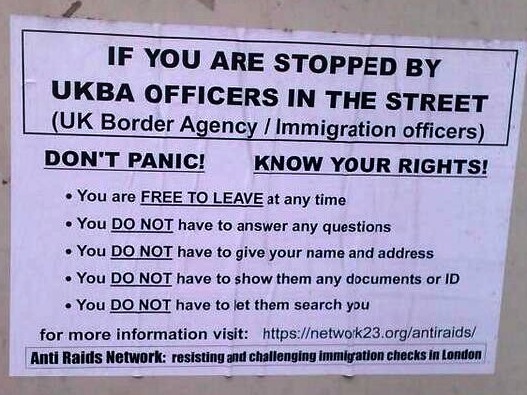UKBA Use Stop and Search Powers: Inadequate, Impractical, Short- term and Risky
This week yet another of the UKBA’s strategies to deal with Illegal Immigration kicked up a storm; there have been many outcries at how the operations have been carried out and some have even labelled it racist. So what are these powers? What are your rights? And will this be the answer to the ever-hot issue of illegal immigration?
Not the same as police
Contrary to what some might think, Immigration Officers, do not have the same powers as the police to stop individuals in public places. Although they have extensive powers at immigration control points at ports of entry to question individuals, their right to examine people in order to determine their immigration status ‘in-country’ only applies in certain circumstances.
This stop and question powers are provided for under paragraph 2 of Schedule 2 to the Immigration Act 1971. (See Chapter 31 Enforcement Instructions and Guidance Restricted Document Restricted Document). The court issued a useful analysis of these powers in Singh v Hammond, which held that such a search couldn’t be carried out randomly but only on intelligence. i.e. Before seeking to question someone, the immigration officer should have information in his possession which is sufficient to constitute a reasonable suspicion that that particular person may be an immigration offender. The UKBA officer should, therefore, be able to justify the reasons why they considered that threshold to be met in each particular case.
You must first consent to the questioning and don’t have to answer any questions.
In the Singh v Hammond, the court held that” Any questioning must be consensual. Paragraph 2 power to examine does not include a power to compel someone to stop or to require someone to comply with that examination. Should a person seek to exercise their right not to answer questions and leave, there is no power to arrest that person purely on suspicion of committing an immigration offence.
So in short, for our young gentleman late for an interview, a simple answer of “ I am a British National and now is not a good time mate!” should suffice and off to his job interview.
The issue of Illegal Immigrants seems to always be very topical especially around election time. I sincerely sympathise with the frustration of trying to devise new measures to tackle the issue of immigration when continuously facing obstacles from Local courts, European courts and concerned citizens. This new move strategy has angered some ethnic minorities who feel targeted due to colour. Similar powers have historically been used by the Police to harass ethnic minorities and thus they have a legitimate reason to fear this new Home Office strategy.
The problem is that those who will be stopped will be predominately those who “look like migrants” and if you have been in a city like London, you will understand the cosmopolitan composition with a lot of Black or Asian British who were born and raised in the UK. And though, Under the Equality Act 2010 ….IO must not stop an individual based upon their race-linked features/appearance and/or race. Colour can never be the basis of the IOs ‘reasonable suspicion’ that someone has committed an immigration offence.
The bottom line for me is that, while I agree that the issue of illegal immigrants must be dealt with, this should not result in legal migrants and British Nationals of a different ethnic background being treated with suspicion or being made to feel uneasy. If you can’t stop everybody and ask for their ID then maybe this is not a workable strategy, as it is difficult to safeguard against UKBA officers stopping individuals based on their appearance, which is in contradiction to the Equality Act 2010.

